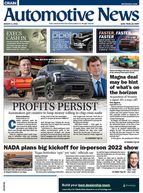Leading the charge is Nidec CEO Jun Seki, an executive well versed in automotive.
Seki was recruited from Nissan Motor Co., where he spent more than three decades rising to the rank of vice COO. The veteran mechanical engineer joined Nidec as a special executive consultant in January 2020, and in June, succeeded Nidec founder Shigenobu Nagamori as CEO.
Seki is now spearheading a new plan that runs through March 31, 2026, to double Nidec's revenue to more than $36 billion — but then more than double it again to about $90 billion by 2030.
The company, which was established in 1973, topped sales of $9 billion in 2014, and is forecasting $15.38 billion in the current fiscal year.
Auto industry growth will figure prominently in Seki's plan. In the fiscal year that just ended, Nidec's automotive division was its third-largest unit, generating sales of $3.24 billion. Under the midterm plan, auto sales are expected to triple to $11.76 billion.
That will put the division on equal footing with Nidec's appliance, commercial and industrial products unit, which makes components for hair dryers, washing machines, vacuum cleaners and even windmills.
By March 31, 2026, Seki expects $9 billion of automotive sales to come from organic growth in traction motors, steering and braking motors and other smaller automotive actuators. An additional $2.71 billion will come through acquisitions.
Nidec thinks it can sell 2.8 million traction motors by 2025 and some 10 million by 2030.
"If we pick up all of those opportunities, we still have a huge opportunity to increase," Seki said during a July 21 briefing that detailed his midterm plan and Nidec's most recent financial results.
Nidec's operating profit advanced 60 percent to ¥44.56 billion ($403.1 million) in the fiscal first quarter that ended June 30. Revenue climbed by a third to $4.05 billion.
In line with its expansion strategy, Nidec also announced that it was in talks with Hon Hai Technology Group of Taiwan and its electric car subsidiary Foxtron Vehicle Technologies Co. about forming a joint venture to make electric vehicle motors in Taiwan.
Hon Hai is better known as Foxconn, the company that assembles Apple's iPhones. Its Foxtron unit is developing EVs based on an open technology platform.
The companies aim to establish the Taiwan-based joint venture next year.
One objective is to supply Nidec's E-Axle traction motor system and other automotive motors to Hon Hai, Foxtron and other customers worldwide, as consumer demand for EVs picks up.
Today, Seki said, the market for EVs is mostly "forced" by government regulation and increasingly stringent emissions rules.
The natural customer demand for EVs will kick in around 2025, he predicted. That is when recharging infrastructures will be sufficiently developed and EV pricing will fall below that of hybrid vehicles.
"Combining those, definitely, EVs will be purchased by customers because they're cheaper, convenient and friendly," Seki said. "So forced demand will move to actual demand after 2025."



